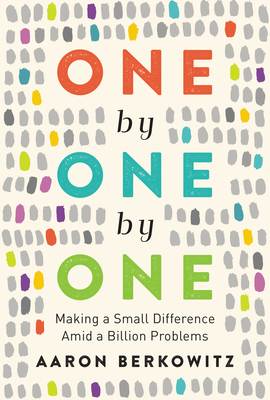
One by One by One
Making a Small Difference Amid a Billion Problems
ایجاد تفاوت کوچک در میان یک میلیارد مشکل
کتاب های مرتبط
- اطلاعات
- نقد و بررسی
- دیدگاه کاربران
نقد و بررسی

January 20, 2020
Berkowitz shares his experience as a young neurologist providing care to Haitians who lack access to basic health care in this touching debut. Berkowitz began working in Haiti a few months out of residency at Brigham and Women’s Hospital in Boston. He also trained Haitian neurologists and, through an eager doctor practicing in Port-au-Prince, he met Janel, a 23-year-old with a massive brain tumor. Janel could only be treated in the United States—if at all—which inspired Berkowitz and a dedicated team at Brigham and Women’s Hospital to make a “big save.” Berkowitz’s efforts to provide Janel with treatment, despite criticisms about its cost-effectiveness, shape the book’s trajectory. Unfolding in a journalistic style, Berkowitz’s tale balances the twists and turns of Janel’s case with the author’s own reflections on the ethics of health care inequity. Berkowitz asks difficult, sometimes heartbreaking questions about how to treat poor people when they have no access to care. While Berkowitz provides few answers, his harrowing stories provide plenty to ponder.

April 15, 2020
A close-up, personal look back at humanitarian efforts through the eyes of a doctor who has worked in Haiti and other areas of the world in desperate need of medical care. Berkowitz, a former Harvard Medical School professor and the founding director of Global Health at Kaiser Permanente School of Medicine, writes movingly of his days as a young neurologist facing the challenges of saving one Haitian's life in a country where the vast majority of citizens lack basic medical care. "More than half the population lives on less than two dollars a day, and about a quarter on less than one dollar a day," he writes. "So patients go to the closest doctor they can find." When 23-year-old Janel arrived with an extraordinarily large brain tumor, the author hoped for a positive outcome by way of surgery in the U.S. With a novelist's touch for bringing to life people and places, he tells of the complexities of arranging Janel's treatment--raising money, getting Janel a passport, finding the surgeon and the hospital--and of the complications that ensued, including surgeries, chemotherapy, radiation, and rehabilitation. During this learning experience, the young Berkowitz discovered a significant lesson of humanitarian work: that success and failure are not clear-cut. Also vital, he realized, is the importance of remembering the individuality of the patients who make up the statistics of public health. As the Haitian proverb goes, "every person is a person"--"tout moun se moun" in Creole Haitian, a language that appears frequently in the narrative (an English translation follows each instance), which adds unique flavor to the prose. Recalled conversations and text messages abound, giving the text a refreshing immediacy and allowing the personality of each of Berkowitz's many colleagues to emerge. The author also charmingly recalls his interactions with Partners in Health founder Paul Farmer, a "rock star" in the arena of global health. A poignant and unsentimental account by a dedicated doctor doing palpable good.
COPYRIGHT(2020) Kirkus Reviews, ALL RIGHTS RESERVED.

May 15, 2020
Neurologist Berkowitz (founding director, neurology, Kaiser Permanente Bernard J. Tyson Sch. of Medicine) writes an honest, moving portrait of the joys, complexities, tragedies, and teamwork he encountered while working with patients in developing nations. Much of his experiences were in rural Haiti, where he worked to bring patients with varying neurological conditions to the U.S. Berkowitz addresses the cultural, legal, and medical obstacles that health and humanitarian organizations and individuals must overcome. He talks at length about the various patients that he and members of Partners in Health, a global health organization focused on "restoring social justice by bringing quality health care to the most vulnerable around the world" brought to Boston for surgery, including updates on their lives after treatment. Throughout, the author admires the spirit of the people he encounters. He also sheds light on disparities in health care worldwide and what they mean for people with complex medical issues. VERDICT Readers who enjoy books about medical workers around the world such as Tracey Kidder's Mountains Beyond Mountains, as well as Atul Gawande's works, will appreciate this unflinching and inspiring read.--Aaron Klink, Duke Univ., Durham, NC
Copyright 2020 Library Journal, LLC Used with permission.

May 1, 2020
An accomplished American neurologist and public health expert recounts his vivid experiences as a young volunteer doctor with the nonprofit organization, Partners In Health in Haiti. As the title implies, Berkowitz approaches the world's vast health care challenges by focusing on individuals. Much of his striking memoir revolves around Janel, a 23-year-old man who suffers from headaches and dizziness and has trouble walking. He is diagnosed with a large brain tumor and stays for almost a year in Boston, free of charge, undergoing five neurosurgical procedures and weeks of chemotherapy, radiation therapy, and physical therapy. The medical care of a five-year-old boy with quadriplegia and a pastor with a pituitary gland tumor causing blindness are also chronicled. Berkowitz is candid about the conflicts between altruism and self-doubt, his advocacy for patients and the daunting obstacles to securing their treatment. Approximately four-billion individuals worldwide lack access to basic health services. Berkowitz's highlighting of the valuable work of Partners In Health is inspiring, and his account is a worthy follow-up to Tracy Kidder's portrait of Dr. Paul Farmer in Mountains beyond Mountains (2003).(Reprinted with permission of Booklist, copyright 2020, American Library Association.)

























دیدگاه کاربران